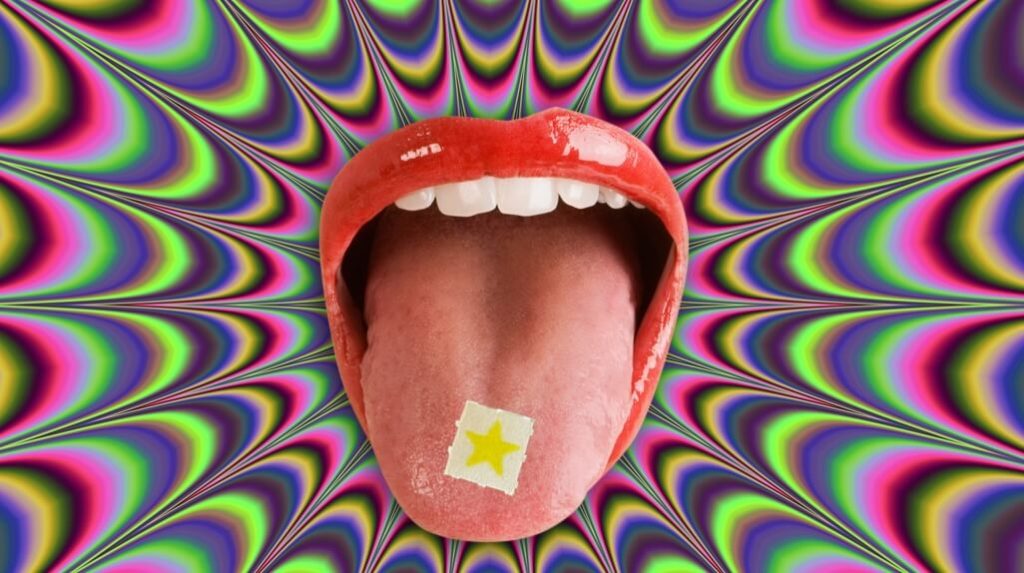Buy LSD BLOTTERS online UK + Free Shipping
Low: 25-100 μg
Medium (Our Product): 100-250 μg
High: 250-350 μg
where-to-buy-lysergic-acid U.K
where can i find lysergic acid
buy lysergic acid diethylamide
buying lysergic acid diethylamide
lysergic acid diethylamide for sale
what drug is made from lysergic acid
Buy Lysergic acid diethylamide online UK
BUY LSD ONLINE DISCREECTLY IN UK
LSD typically sold in liquid form or applied to blotter papers, sugar cubes, gelatin squares, and tablets. LSD blotters are sold according to tabs which are counted as small squares of this buy LSD infused blotting.
paper “100 Tabs” Each sheet is made of 100tabs (10-10) LSD Tobs(Acid Blotters) 200ug where to buy in uk BUY LSD ONLY DISCREETLY IN UK Description Drug class Hallucinogen (serotonergic psychedelic) Other names LSD, LSD-25, Acid, Delusid, others Duration of action 8-12 hours Onset of action: 30-40 minutes Elimination half-life: 36 hours Metabolism Liver (CYP450) How do the effects Come in? Start: 30-90 min Peak 2-3 hours Duration: 9-12 hours The START time stated above is when you actually begin to feel the mind blowing effects of purchase LSD from the time when you fest ingest it after which the effects will start to wind down and you might start to feel the calm-down/comedown effects. Effects Of USING LSD The physical effects of LSD are unpredictable from one person to another when taken orally (by mouth) the first effects of the drug
1P-LSD: Is “Legal Acid” Legit? Is it Safe?
1P-LSD is a prodrug of LSD that shares virtually identical effects. In some places, 1P-LSD is unique enough from LSD to be considered “legal.”
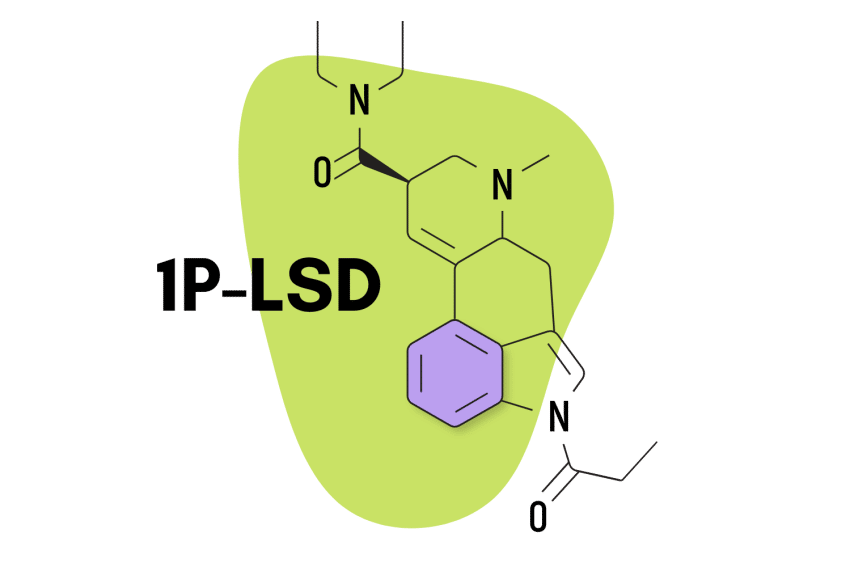
By now, you’re probably familiar with LSD (lysergic acid diethylamide). It’s the quintessential psychedelic substance alongside the active ingredient in magic mushrooms — psilocybin.
What you may not be familiar with is that there are actually dozens of analogs of LSD that have virtually identical effects.
1P-LSD is one such analog. The molecular difference is subtle, and recent research even suggests 1P-LSD is a prodrug of LSD. This means that when you take 1P-LSD, it’s converted to LSD to produce psychedelic effects.
1P-LSD is legal in Canada and held in a legal grey area in the United States.
Here’s everything you need to know about 1P-LSD.
What is 1P-LSD?
1P-LSD stands for 1-propionyl-lysergic acid diethylamide. It’s a derivative of LSD — which essentially means it’s a modified version of the classic LSD-25 that Albert Hofmann discovered in 1943.
This molecule is differentiated from LSD by a propionyl group attached to the nitrogen molecule in the indole portion of LSD. The central indole molecule of LSD is the characterizing element of the molecule that’s shared with all other tryptamine-based psychedelics (such as DMT or psilocybin).
1P-LSD itself is only mildly psychedelic. It has a 67-fold less binding affinity for the 5-HT1A receptors, 13-fold less activity at the 5-HT2A receptors, and a 3.5-fold increase at h5-HT2C receptors than LSD-25 [1].
However, 1P-LSD is a prodrug for LSD, which means it’s converted to LSD by the liver, which then goes on to produce psychoactive effects [2]. The bioavailability of LSD from 1P-LSD is nearly 100%.
1P-LSD: Specs & Technical Details
| Active Ingredient | 1-propionyl-lysergic acid diethylamide |
| Level of Risk | Low |
| Other Names | Legal Acid |
| Most Common Side-Effects | Anxiety & paranoia |
| Duration of Effects | 7 – 11 hours |
| Legality | Not Scheduled In Most Countries (Legal Grey-Area) |
1P-LSD Harm-Reduction & Responsible Use Summary:
- 🐍 I understand why psychedelics should be treated with respect
- ⚖️ I’m familiar with the laws for 1P-LSD in my country & state
- 🍄 I’m familiar with and confident in the dose I’m taking
- 🧪 I’ve tested a sample of the substance I’m using with a drug testing kit
- 💊 I’m not mixing any medications or other substances with 1P-LSD
- 🏔 I’m in a safe & comfortable environment with people I trust
- 🐺 One of the members of my group is responsible and sober (AKA a trip sitter)
- ⏳ I have nothing important scheduled for after the trip
- 🧠 I’m in a sound & healthy state of mind
- 📚 I’m familiar with the four pillars of responsible psychedelic use — set, setting, sitter, & substance.
- ⏳ Know the timeline — the effects of 1P-LSD are going to last between 7 and 11 hours.
- 🙅♀️ Know when to avoid lysergamides — don’t take 1P-LSD if you have underlying heart, neurological, or psychiatric disorders.
Where Did 1P-LSD Come From?
Since the prohibition of LSD and other psychedelics in 1966, chemists have been seeking to discover new psychedelic “research chemicals” or “designer drugs.”
Researchers like Alexander Shulgin and Dr. David E. Nichols (Purdue University) have made a lot of progress over the years.
It’s unclear when 1P-LSD was first invented and by whom — but it was first officially reported in 2015 by the European Monitoring Centre for Drugs and Drug Addiction (EMCDDA).
This compound entered the market as a “legal LSD alternative” in the mid-2010s without any previous mention in scientific literature. Whoever invented it didn’t publish anything about it and has made no attempt to take credit for their discovery.
Other LSD Analogs & Derivatives
What’s The Dose of 1P-LSD?
The dose of 1P-LSD is equivalent to LSD. There have never been any studies on the effective dose of 1P-LSD.
However, with recent findings that 1P-LSD is converted to LSD at a rate of nearly 100%, the psychoactive dose would be identical to that of LSD:
- Microdose — 10–20 micrograms
- Threshold Dose — 25–40 micrograms
- Standard Psychoactive Dose — 80–200 micrograms
- Heroic Dose — 200–400 micrograms
What Does 1P-LSD Feel Like?
The effects of 1P-LSD are virtually identical to that of LSD. The only difference is that it can take a little bit longer for the effects to kick in. This is because the 1P-LSD needs to first be metabolized by the liver and turned into LSD.
The experience can vary widely depending on your internal mental state. If you’re depressed or anxious going into the experience, 1P-LSD is going to inflate this even further. Likewise, if you feel excited, positive, and curious, 1P-LSD is going to expand this state of consciousness even further.
This is exactly why the concept of set (mindset) and setting (the environment and people you’re with during the trip) is so important. Going into the experience with a negative attitude, which can include fear, anxiety, or depression, will ultimately lead to a more challenging experience and may even pose psychological harm.
The positive effects of 1P-LSD and other LSD analogs:
- A strong sense of awe & wonder
- Altered perception of time
- Cathartic experiences
- Deep-reaching insightful experiences
- Ego-dissolution
- Euphoria
- Hallucinations
- Laughter
- Mystical experiences
- Remembrance of significant life events
- Synesthesia
The negative effects of 1P-LSD and other LSD analogs:
- Anxiety
- Believing people are “out to get you”
- Confusion and frustration when performing routine tasks
- Feelings of being overwhelmed
- Paranoia
- Reliving past traumatic experiences
- Triggering of psychosis or other mental illness
These negative effects can’t always be avoided, but they can be significantly reduced by following our guidelines for the responsible use of psychedelics.
How Long Does 1P-LSD Last?
1P-LSD lasts roughly the same amount of time as LSD (6 – 10 hours).
After taking 1P-LSD, it’s converted to LSD. This happens quickly but prolongs the amount of time needed for the effects to appear. LSD usually takes less than 30 minutes to kick in, while 1P-LSD can take up to an hour and a half (usually around an hour). This also extends the total duration of the trip.
The estimated duration of effects for acid is 6 to 10 hours, which means 1P-LSD is roughly 7 to 11 hours when you account for this difference.
How to Take 1P-LSD
1P-LSD is taken the same way as LSD. It’s spread out over a square of blotter paper and then held under the tongue for 10 or 15 minutes before swallowing it whole.
The active ingredients are absorbed through the capillaries under the tongue, directly into the bloodstream.
Most people hold LSD under the tongue for faster onset of effects because it allows it to enter the bloodstream directly — rather than having to travel through the digestive tract first.

However, 1P-LSD may actually kick in faster if you swallow the tab instead.
This is because, unlike acid, this psychedelic needs to be activated by the liver. When you absorb compounds like this through the gut, they’re sent directly to the liver, which does a “first-pass metabolism” before entering the systemic circulation.
How Strong is 1P-LSD Compared To Other Psychedelics?
1P-LSD is one of the strongest psychedelics, gram for gram, on Earth. This is a title held by all psychoactive LSD derivatives, which are profoundly psychoactive at sub-milligram doses.
For example, the dose of 1P-LSD is around 200 micrograms, which is about 0.2 milligrams. Compare this to psilocybin (the active ingredient in magic mushrooms), which is closer to 10 milligrams. 5-MeO-DMT, the active ingredient in the Bufo alvarius toad (another powerful psychedelic), has a dose of around 8 milligrams, and N,N-DMT, the active ingredient in ayahuasca, is nearly 50 mg.
1P-LSD vs. LSD-25
LSD-25 is the classic version of LSD invented by Albert Hofmann in the 1940s. It’s the compound that was popularized during the 1960s and beyond by people like Timothy Leary, Richard Alpert (Ram Dass), Nicolas Sand, Tim Sully, Ralph Metzner, and others.
Compared to LSD-25, 1P-LSD is virtually indistinguishable. There are some reports that 1P-LSD is weaker, others suggesting it’s stronger. The consensus is that the two are identical in terms of their effects and dosage.
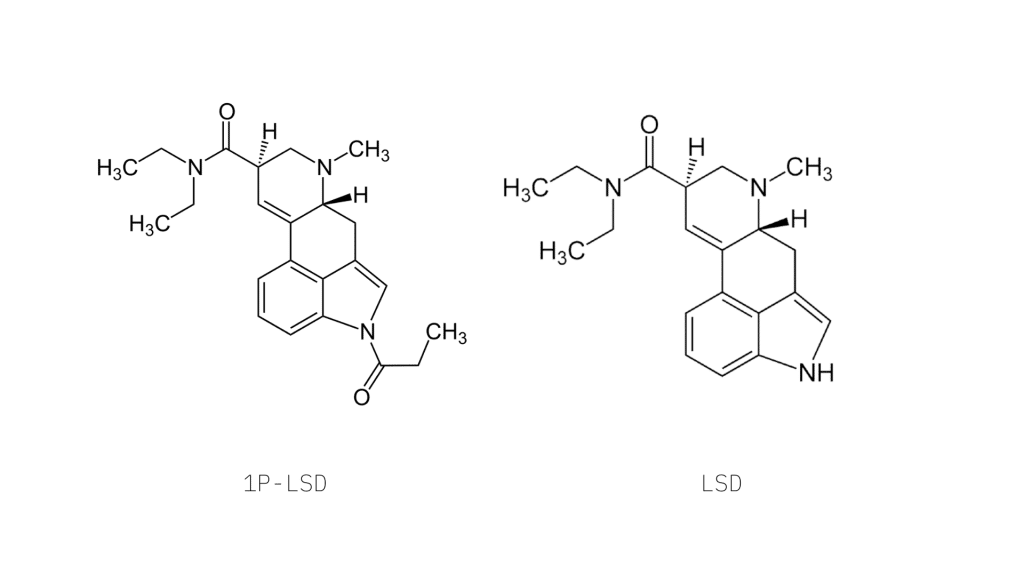
1P-LSD vs. AL-LAD
AL-LAD (N6-allyl-6-norlysergic acid diethylamide) is another derivative of LSD-25 with a similar chemical structure as 1P-LSD.
The dose and overall experience are very similar, but with a few subtle subjective differences.
For example, AL-LAD is thought of as being a more mellow version of acid. It has a stronger visual aspect, but it’s less introspective. This means it’s going to be a bit easier to handle from a philosophical perspective and less likely to result in issues with ontological shock or existential anxiety — something that can stem from the psychedelic experience.
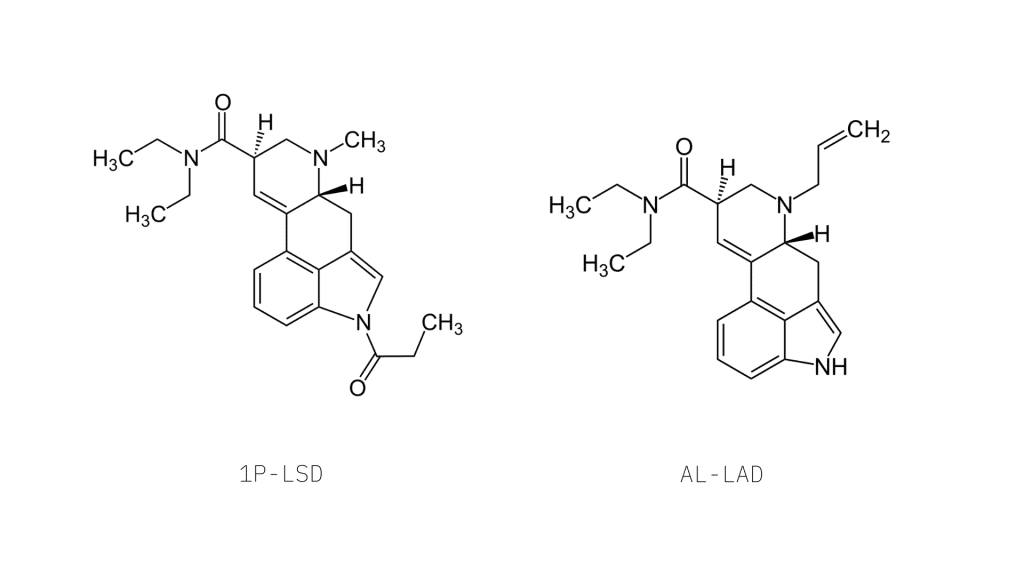
1P-LSD vs. LSA
LSA (lysergic acid amide) is the active ingredient in Hawaiian baby Woodrose and morning glory vine. It’s very similar to the effects of LSD-derivatives like 1P-LSD but with a few key differences.
For one, LSA is less potent than 1P-LSD. The standard psychoactive dose is around 800 micrograms rather than 200 for 1P-LSD.
Secondly, the LSA experience is less introspective and psychedelic and more lucid and sedative. It often leads people to fall asleep where they experience complex, vivid, and memorable dreams. Even while awake, the experience feels very dreamlike.
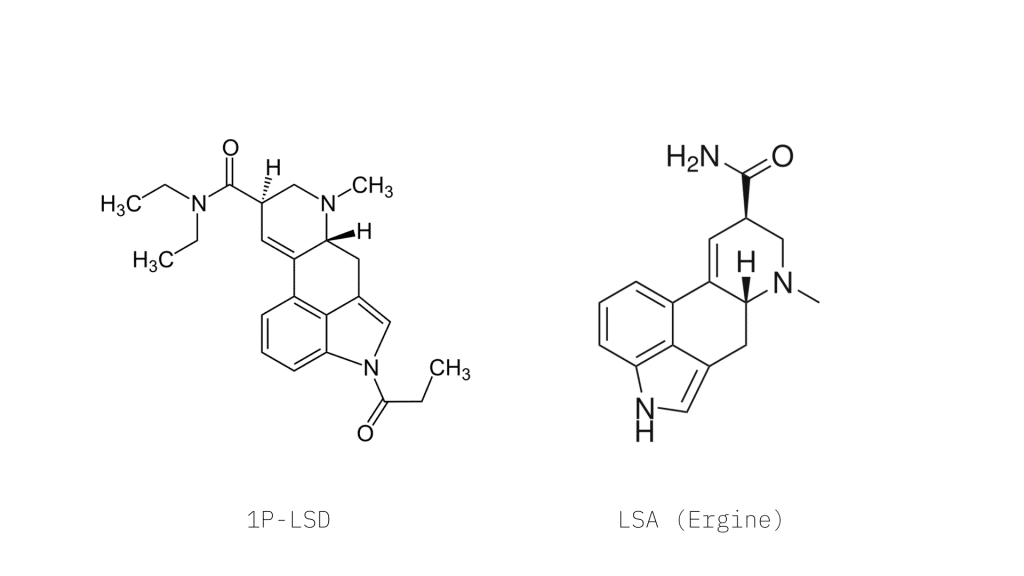
1P-LSD vs. ALD-52
1P-LSD is a homolog of this ALD-52, which means it’s virtually identical aside from having an extra carbon atom.
Technically speaking, 1P-LSD has a propionyl group attached to the nitrogen atom in the indole group, while ALD-52 has an acetyl group instead.
The effects of these two molecules are essentially identical.
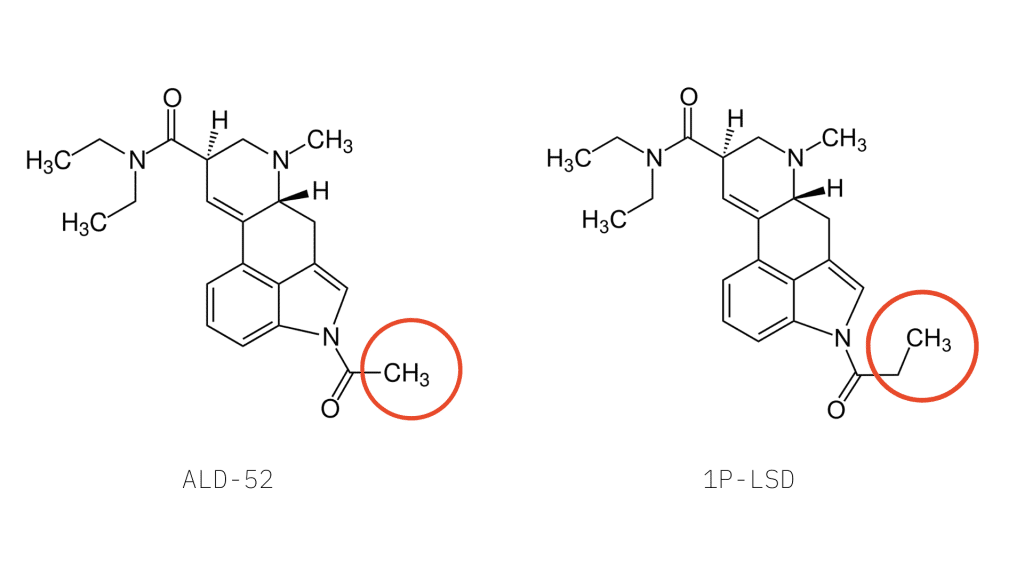
1P-LSD vs. ETH-LAD
ETH-LAD (6-ethyl-6-nor-lysergic acid diethylamide) is the strongest member of the lysergamide psychedelics (there’s some debate to this).
ETH-LAD is considered to be roughly 20% stronger than 1P-LSD when taken at the same dose. It has stronger visuals and produces a strong sense of connection and introspection.
The downside of this compound is that it also tends to cause some negative physical side effects — such as stomach upset and increased urination. This can lead novice users to panic and experience a more challenging trip.
Because of this, ETH-LAD is not recommended for people who are new to psychedelics. 1P-LSD is a better option for these people, and is much less likely to cause a “bad trip.”
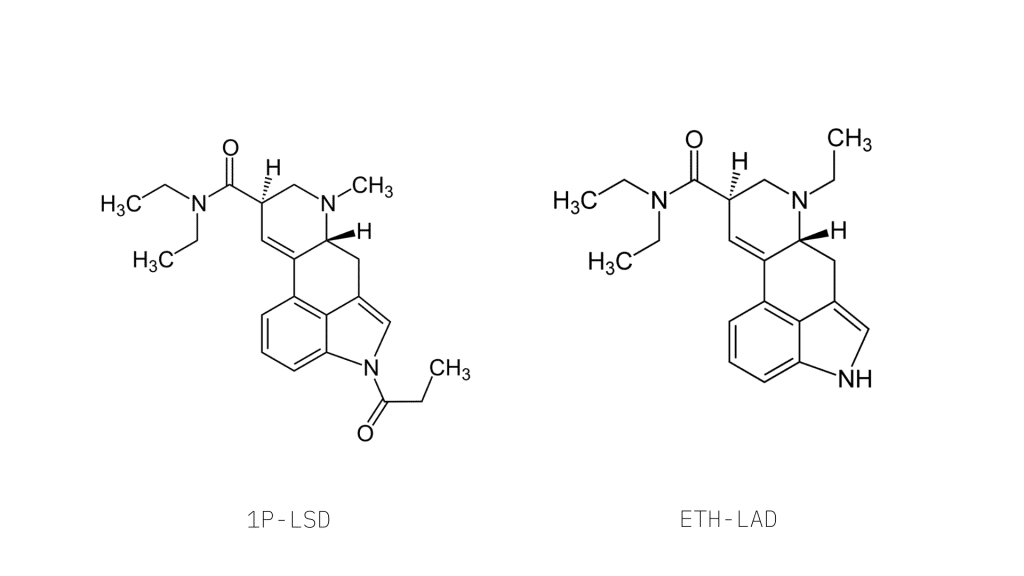
1P-LSD vs. PRO-LAD
PRO-LAD (6-propyl-6-nor-lysergic acid diethylamide) was discovered sometime in the early to mid-80s by Dr. David Nichols and his team at Purdue University.
This compound is slightly weaker than 1P-LSD — but most people won’t be able to tell the difference between these two psychedelics.
The main difference, as pointed out in various trip reports, is that PRO-LAD has a stronger body-high component than 1P-LSD.
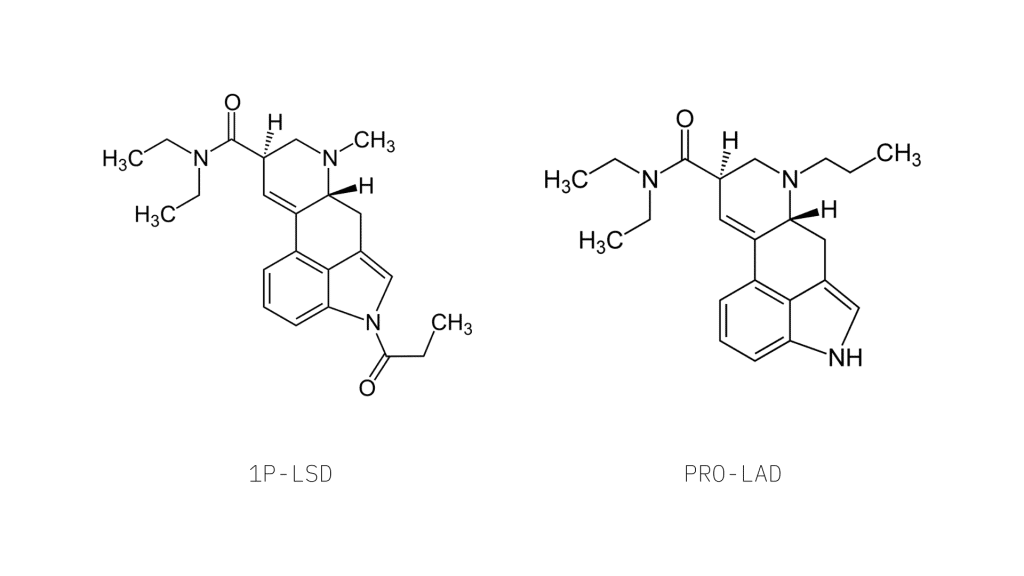
1P-LSD vs. LSZ
LSZ (lysergic acid 2,4-dimethylazetidide) is the second strongest lysergamide psychedelic. It’s similar in potency to ETH-LAD, but less likely to result in physical side effects.
Compared to 1P-LSD, LSZ produces a stronger “emotional” experience. Many people who take this psychedelic report a strong sense of connection and empathy with others.
This effect is also found with 1P-LSD, but not quite as intense.
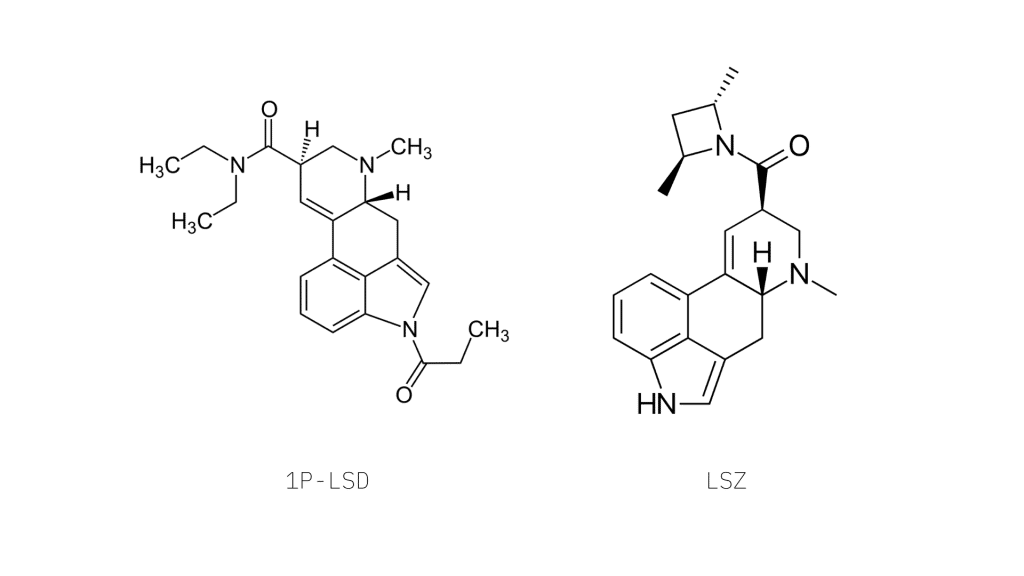
Is 1P-LSD Safe?
There have never been any clinical studies on 1P-LSD to confirm its safety in humans, and this compound has only been on the market for a couple of years now.
With that said, there have never been any reported cases of toxicity or deaths associated with this compound. Preliminary research suggests it shares the same effect profile and safety as LSD-25 — a compound with copious amounts of research proving the high safety incidence of this compound.
Responsible Use of Psychedelics
As is the case with all psychedelics, it’s critical that you understand how to stay safe with these compounds before you begin. While there isn’t much of a risk in terms of physical side effects, these substances carry the risk of psychological harm.
People with a history of psychosis, schizophrenia, or other mental illness should always consult a psychologist before using psychedelics. While there’s some indication these compounds can help treat mental illness, this needs to be done in a controlled setting under the supervision of a psychotherapist. In this environment, it’s more likely that LSD-25, psilocybin, or 5-MeO-DMT will be used instead of 1P-LSD due to a lack of clinical research.
Risk of Adulteration
One of the benefits of 1P-LSD is its lighter legal restrictions. While this psychedelic isn’t technically legal, it isn’t illegal either (in most places). This means it’s easier to find a legit supplier than it is for overtly prohibited compounds. You can order 1P-LSD from reputable names like Sigma Aldrich, or other brand name suppliers, which significantly decreases the chance of adulteration with potentially harmful compounds.
You don’t need to use the black market to buy this stuff. Blackmarket vendors dramatically increase the risk of ordering fake LSD, which often use NBOMe compounds instead — which are dangerous. There have been many deaths associated with this compound in the past.
No matter where you buy 1P-LSD, you should test it using a reagent drug testing kit. Here’s how to do it.
How to Test 1P-LSD
You only need a small sample to do this effectively, so you aren’t really wasting any money or doses. Just a small sliver of one of your tabs is enough to perform the test.
Substance tests aren’t going to tell you the quality of a tab, but they will tell you if certain compounds are in it or not. The only dangerous compounds that are potent enough to fit on a single blotter paper are LSD and its analogs, NBOMe, or DOMx compounds.
It’s always a good idea to run multiple substance tests for LSD and 1P-LSD. The ideal would be all four mentioned below, but if you’re only going to run one or two, the Ehrlich and Marquis are the most important.
1. Ehrlich Test
This will show you whether the tab contains indole alkaloids (LSD, 1P-LSD, AL-LAD, or other derivatives) or not.
If you only run one test, this is the one.
Place one drop on a small sliver of the tab and wait for it to change color. It should turn purple or dark pink. LSD-25 usually turns right away, while 1P-LSD takes longer (up to 3 minutes).
If there’s no color change, your sample probably doesn’t contain any indole alkaloids and is therefore unsafe to use.
2. Marquis Reagent
The Marquis reagent will identify amphetamines, NBOMe, mescaline, and other substances in your sample. If it turns green, it likely contains NBOMe compounds and should be thrown out.
Follow the chart included in your Marquis test kit for the detection of other compounds.
3. Hofmann Reagent
It’s always a good idea to run two or more tests with different reagents just to make sure. The Hofmann reagent is used to differentiate certain indole alkaloids.
If the sample turns purple, it’s likely an LSD-derivative. If it turns green, it’s 5-MeO-DMT; if yellow, it’s N,N-DMT.
4. Mecke Reagent
The main role of the Mecke reagent is to determine whether there are any opiates in the sample. Since most opiates aren’t strong enough at sub-milligram doses, and the experience of these substances is nothing like LSD, it’s very unlikely for there to be any opiates in the sample.
This test is extra, just to be safe. It’s easy to run the Mecke test to make sure the sample doesn’t contain ultra-potent forms of opiates like fentanyl or kar-fentanyl.
If the Mecke reagent turns blue, it means the sample contains opioids and should therefore be avoided.
Is 1P-LSD Legal?
Technically, 1P-LSD isn’t listed as a controlled substance in either Canada or the United States.
In both countries, you can order this substance from various sources online. In Canada, it’s very unlikely to experience any legal troubles for being in possession of this substance.
In the US, 1P-LSD could be considered illegal by the DEA under the Federal Analog Act because of its similarity to LSD-25. However, there have yet to be any convictions for the possession of 1P-LSD, and the DEA has never officially mentioned or made any statements about this compound.
Some countries in Europe have added 1P-LSD to their list of prohibited substances, including:
- France
- Finland
- Denmark
- Germany
- Estonia
- Japan
- Latvia
- Norway
- Romania
- Sweden
- Switzerland
- The United Kingdom
- The Czech Republic
Related: List of legal psychoactive substances in the US, Canada, and the UK.

Final Thoughts: What’s The Future of 1P-LSD?
This psychoactive substance is virtually identical in its effects to LSD. It’s a prodrug of LSD-25, which means it’s converted into LSD by the liver, which then goes on to produce psychoactive effects.
Because LSD is banned, and 1P-LSD isn’t (in most places), it’s used the exact same way as LSD.
As more countries find out about this analog, they’ll likely move to place it under the same regulations as LSD.
More liberal countries, like Canada, are unlikely to make this change as laws are already moving towards legalizing LSD anyway. This compound is not dangerous, and there’s no indication it’s going to pose any additional risk to society. We’ll likely see more of this compound in the near future until LSD-25 becomes legal.
LSD-25 is easier to produce and has a faster onset time than 1P-LSD. When you consider that the two have the same experience, LSD is the slightly better option.
References
- Grumann, C., Henkel, K., Brandt, S. D., Stratford, A., Passie, T., & Auwärter, V. (2020). Pharmacokinetics and subjective effects of 1P‐LSD in humans after oral and intravenous administration. Drug testing and analysis, 12(8), 1144-1153.
- Brandt, S. D., Kavanagh, P. V., Westphal, F., Stratford, A., Elliott, S. P., Hoang, K., … & Halberstadt, A. L. (2016). Return of the lysergamides. Part I: Analytical and behavioral characterization of 1‐propionyl‐d‐lysergic acid diethylamide (1P‐LSD). Drug testing and analysis, 8(9), 891-902.


